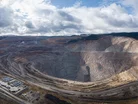Ontario’s Building More Mines Act speeds up mine permits

Canada's Mines Minister George Pirie has revealed that the new proposed Building More Mines Act will substantially reduce the time it takes to grant mine permits and get operations underway. In an interview with The Northern Miner, Pirie admitted that the ministry had held a “merry-go-round” of consultations with the committee on environmental regulations before the act was passed.
“Things that used to take two months now routinely take two to five years. An endless process of questions and replies and more questions and more replies. So, we want to use the experts in the field rather than the bureaucrats… to simplify the process and get to the right endpoint quicker," he said.
Regarding the role of experts in mine closures, Pirie said that he and the ministry would still do the final certification. However, the new act requires that experts, called "qualified persons," provide the majority of input and certify most aspects of the closure plans.
‘’That’s a significant advantage so that permitting these mines is conducted at the speed of business,’’ he added.
As Mayor, George oversaw the largest mining boom in fifty years. Before entering municipal politics, he was a senior mining executive for over thirty-five years. As someone with such an extensive background in the mining industry, it is safe to say he knows the territory well. However, the new legislation has met criticisms, and opponents have accused the government of politicising the permitting process.
Is Ontario shaping up to be a high-tech minerals grocery store for the world?
In response to Ted Hsu, MPP for Kingston and the Islands who noted that ministry officials would no longer be assessing mine plans, and other MPPs drawing attention to the so-called vagueness of the term ‘qualified persons’ and its potential for conflict of interest. Pirie responded that ''the ministry will still give input on the plans and has final say on closure processes.'' Emphasising that ''the ministry will achieve those shorter timelines without sacrificing the duty to consult with Indigenous people or environmental regulations.''
As international automakers and digital companies prepare for zero-carbon technologies, the northwest and Timmins area are becoming exploration hotbeds for lithium, nickel, platinum group metals, and other raw materials.
The province plans to establish a mine-to-electric vehicle (EV) plant supply chain. The Mines Minister said establishing a new mine shouldn't take more than a decade.
“We won’t be able to achieve our goals of building the mines to extract the critical minerals to achieve a secure supply chain to stay part of this EV revolution…if it’s going to take 15 years. 15 years is not acceptable.”
